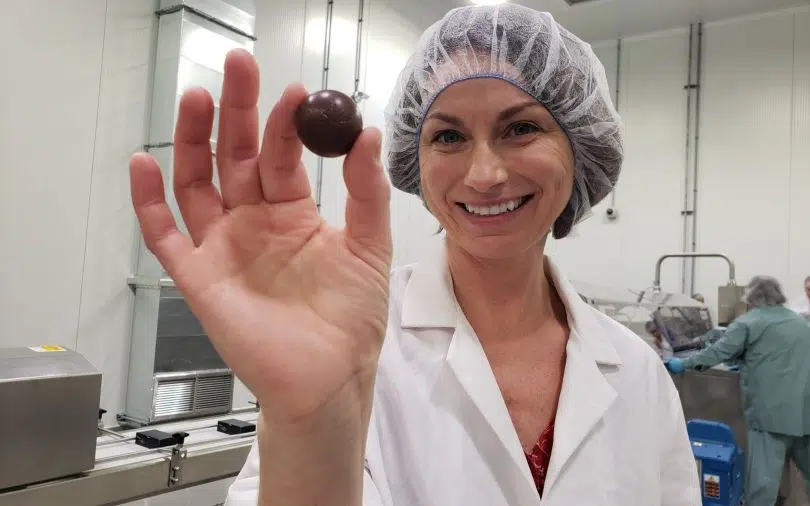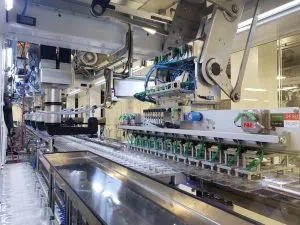
Ginette Ahier holds an Edison Byte truffle. (Image: Inda Intiar/Huddle)
Up to 60,000 milk- and dark-chocolate truffles infused with cannabis are produced by Organigram’s new multi-million automated manufacturing line every eight hours. The first packages of these truffles are being shipped to retailers this week.
The truffles, branded ‘Edison Bytes’, are Organigram’s first edibles to go to market. They’re round chocolate bites, filled with a creamy chocolate centre infused with THC, the psychoactive substance in cannabis.
“[Chocolate is] what we’ve kind of committed to as our major play within the space,” said Ray Gracewood, SVP of marketing and communications, noting that around 40 percent of the edibles market in most regulated states are dominated by chocolate.
“We might modify that strategy or look at different product types as we go forward. But for now, our big bet is we think a new sophisticated cannabis consumer is going to really react well to chocolate as a base product.”
The company is selling the truffles in two sizes, a one-pack and a two-pack. Because federal regulations only allow 10 mg THC per retail unit, the box with one truffle inside are infused with 10 mg of THC and the box with two truffles is infused with 5 mg of THC each.
But the truffles are just one type of chocolate product from Organigram’s planned line of edibles.
“Under our Edison brand, we aimed for a more rich cacao profile offers instead of going different flavours. For our Trailblazer brand, we’re looking into more of the hip, trendy flavours. We will launch Trailblazer mint-chocolate snacks and mocha-chocolate snacks,” said Ginette Ahier, Organigram’s edibles product manager who is also the founder of Shediac’s artisan chocolate company Adorable Chocolat.
Edibles became legal in Canada last October, opening a new market for the country’s licensed producers, including Organigram.
Gracewood says in other regulated markets, such as those in certain U.S. states, so-called Cannabis 2.0 products represent about 50 percent of the market. He says that means the introduction of these products in Canada would double the size of the country’s cannabis market.
Ahier added that the company’s research shows half of the non-cannabis users are “more than comfortable” trying regulated edibles. Boomerang consumers – people who have used cannabis but stopped, and those who are against smoking are also more comfortable with edibles.
Many consumers of edibles consume with friends or at dinner parties, and they seek out the gastronomic experience, leading Organigram to the path of chocolate instead of gummies or other forms. This is also why the company tests the products against non-infused premium chocolate brands that can be found in grocery stores.
“It’s all about the consumer. They’re the ones buying it, they’re the ones that will come back, they want a delicious product,” Ahier said.
Organigram invested $15-million into its chocolate manufacturing department, which includes a fully automated production line that only requires around 12 full-time employees to run it from start to finish – i.e. from raw chocolate to ready-to-ship cartons.
The production line includes machinery from various companies in different countries, but “the core technology is generally European-based,” said Gracewood. Ahier added that the equipment allows 99.6 percent accuracy of infusion.
“We’ve invested in a frozen cone technology which allows us to do a filled-centre in a very cost-effective and speedy operational environment,” Gracewood said.
The company’s foray into chocolate included assembling a high-calibre team with a combined 150 years experience in the manufacturing, product development and engineering of chocolate, and working with Canada’s Smartest Kitchen on consumer trend research.
“We’ve invested to the point where we look down the road at five, 10, 15 years we want to be the chocolate leaders and infused cannabis in Canada,” Gracewood said.
Organigram plans to sell the Bytes wherever its Edison brand-products are available, but “we’ll be sort of working thru the process of getting full distribution for these products,” Gracewood said.
In the future, Organigram sees opportunities to increase its market share in infused-chocolate products through co-manufacturing deals with other companies. Gracewood said some have approached Organigram and there have been initial conversations.

Ray Gracewood observes the chocolates being made in the production line. Image: Inda Intiar/Huddle
“It’s given us a sense that there’s certainly interest within this industry,” he said.
Going forward, Organigram also plans to look at different flavours, shapes, treatment of the chocolate, and different chocolate products in general. Plus, if regulations change elsewhere in the world, the company won’t hesitate to look at expanding its products’ reach internationally.
“The general consensus is that chocolate products are in short supply and huge demand right now, and it’s causing a lot of the players in our industry to at least get a handle on what that opportunity might look like,” Gracewood said.
The one-pack will retail at Cannabis NB at $9.50 each, and the two-pack will go for $11.99. The packaging for both are the same size, a bit more than what’s needed. But that’s because of regulations that require “so much physical space on our packaging for warnings, labeling, the THC logo” and other things, said Gracewood.

Part of Organigram’s new chocolate production line. Image: Inda Intiar/Huddle
Inda Intiar is a Reporter with Huddle Today, a content sharing partner of Acadia Broadcasting.



